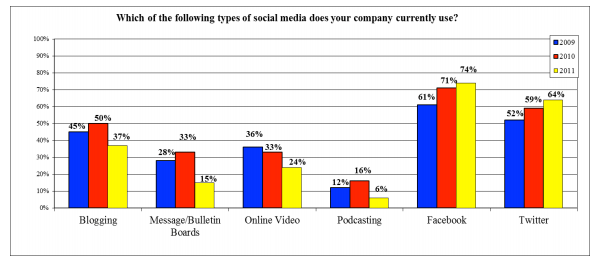
This post started off as a few thoughts, but quickly turned into a passionate rant (my favourite)! I would love to hear your thoughts, opinions, and perspective in the comments section below! Enjoy! ~@TyrellMara
This morning I saw an article in USA Today that caught my eye, it was titled "More Companies quit blogging, go with Facebook instead"
It looked like an interesting article (backed by a substantial UMASS Dartmouth study), so I dove in a bit deeper…
Here is what I found!
The Stats on Business Blogging are Out…
The USA Today article quotes a UMASS Dartmouth study stating that the percentage of companies that maintain their blog have fallen to 37% in 2011 from %50 in 2010. These numbers include both mom and pop shops, as well as large multinational brands such as Bank of America who opted to pass on a business blog and focus their attention exclusively on Facebook and Twitter.
University of Massachusetts Dartmouth Research Study
Business Blogging Downsides
There were several downsides to businesses investing in a blog that were listed, here are a few:
- Maintaining a blog takes considerably more time, energy, and resources than other social media channels
- Companies want to "be where their customers are", hence the focus on Facebook and Twitter
- Companies don't see results from their blogs (sited reason: because they are sales and push marketing focused)
- You need regular content (and to be successful, it has to be good!)
- You need to consider risks of blogging such as accepting comments, opening the conversation up to your audience, and being aware of liability concerns.
The Other Side of the Blogging Coin
I actually very much disagree with many of the downsides stated in the USA Today article around the negatives associated with business blogging. Last year I wrote a post on 9 reasons businesses need to be blogging, but I would like to re-iterate some of my core beliefs:
- Your website is the foundation or "hub" of your online brand and presence, hosting a blog on your website will give potential customers or clients:
- A reason to stay on your site and exposed to your brand longer.
- A reason to visit your site to have their product or service related questions answered.
- A reason to visit your site other than to simply buy your product or service (chances are if you are a new brand to them the trust dynamic will not have been established to the point that they will make a one click purchase),
- A high quality blog can begin to build this trust
- A way for potential customers to find your site through organic search traffic (google/bing/yahoo) because of the relevant keywords you use in your posts.
- A way to pull your potential customers to your hub (website) because they recognize you as a leader in your space, as opposed to pushing sales and marketing messages on your audience.
- A way to be identified as an industry leader/specialist/expert,
- Websites and blogs do this much more effectively than facebook posts or tweets
- A way to share the stories that make your brand unique (YOUR WHY!), begin creating a human voice and personality that represents your business,
- This helps answer an increasingly relevant question: What makes you different/special/unique?
- A way to involve multiple stakeholders both internally as well as externally (more on this in the next section).
Addressing the Downsides of a Business Blog
While I completely agree that maintaining a (great) blog takes considerably more time, energy, and resources than sending a tweet or posting a Facebook update, I think there are unique benefits that are inherent to a business blog as well.
Here are a couple of examples:
Depth of Content = Industry Specialist or Expert
A friend of mine recently mentioned that the company he worked for didn't think they had any reason to have a social presence. That it wasn't relavent to their industry. This organization sold electronic power tools- and because of certain dynamics I agreed that perhaps it wouldn't be the best investment of their time to start using Twitter or Facebook, I did suggest, however, that there could be an opportunity for them to leverage a blog…
Follow my logic for a second:
- Through employees, customers, survey's, and other collection means, the company gathers the top 25 questions consumers have about electronic power tools.
- These questions are assigned to different experts and knowledgable employees within the organization to write a 300 word response to that question,
- Note #1: A key here is that the employees are offering great value through expert content, NOT trying to sell their products.
- Note #2: Diving deeper into this strategy we would see some policies and procedures being implemented so there is consistency and guidelines in the process of involving stakeholders.
- A master schedule is created and twice a month over the next year the company publishes one of these posts to their website… On their "electronic power tools experts blog".
- Through word of mouth, in-store advertising, search traffic, e-newsletters- you can start to build a readership and awareness of your target market who are interested in learning about electronic power tools. You essentially start defining yourselves as industry experts.
Empower Stakeholders and Delegate Workload = Community Business Blogging
We have used this approach at Tekara Organizational Effectiveness to create a truly dynamic and thought provoking thought-leadership blog which requires very little time and energy from any one individual. By involving several stakeholders in the process, in the case of Tekara, these are the consultants who sit around the table, it means a few very important dynamics:
- The voice of the brand is truly represented because it is no longer one person in a marketing role trying to run the whole strategy, but a community of individuals that collectively make up the unique voice of that brand.
- Each individual is able to powerfully speak to their specific passion in alignment with the company, the blog, and then audience. You can see on Tekara's blog there are several different topic areas on the right hand column.
- You now have stakeholders who are empowered in the process and are connected to the success of the blog through having ownership. This means you will see increases in sharing, engagement, and conversation because you are tapping into several personal networks as well as the overarching business network.
- The logic here is that people will naturally share the things they are passionate about. If you can facilitate an environment where stakeholders can publish their expertise and passions, they will be intrinsically motivated to share this with their communities.
Speaking a Common Language
In my experience, social media and social business are still not commonly adopted in the business world… In essence,many businesses and professionals don't understand the overarching language. This again, is one of the limiting factors of a strategy that exclusively focuses on Facebook, Twitter, and other social networks. You will typically be left with a small percentage (usually marketing/social media related) people who have a strong enough grasp on the tools and best practices to drive the initiative. Which means not only will it take an exponential increased amount of time and resources for one or two people to maintain momentum, but you also lose the input, engagement, and most importantly, the voice of many other stakeholders of the brand.
I have found the community blogging strategy incredibly effective because it creates a foundation and common language in a space where much is foreign and overwhelming. No matter what your stakeholders (employees, colleagues, consultants, experts) level of digital fluency or social media adoption is, everyone can create content around their passions.
This taps into one of my most energizing beliefs that we all have a unique voice, and when we are sharing from that place of passion the message is powerful, engaging, and exciting! A business blog is how you empower your stakeholders to share that voice in alignment with the brand and audience!
Concluding Thoughts
I am no expert (far from!). But I still believe that there can be huge benefits and opportunities in a business blog for organization's that strategically understand the bigger picture of their social business (or social media) strategy and how everything must fit together.
That being said, I know every business is different and what works for one, may not for the other, at the end of the day it comes down to many unique factors and the above scenarios do not fit with all.
Where do you stand?
As mentioned in the opening, I am REALLY curious to get some feedback on what others think about these new stats, and the role of having a business blog going forward! If you enjoyed this post, please say hello in the comments below!


